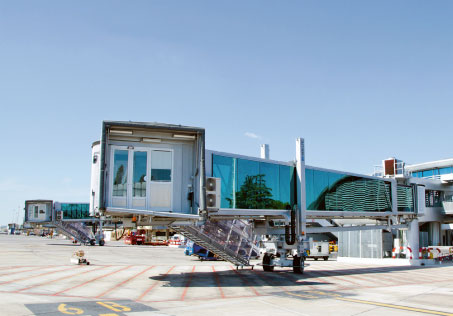
ADELTE’s apron drives (pictured, Valencia Airport) are tailor-made in consultation with each individual airport to ensure that standards and special needs are met.
ADELTE is one of the world’s leading manufacturers of boarding bridges. Based in Barcelona, more than 600 of its apron drives can be found in major airports the world over – the odds are significant that the average traveller has stepped foot upon one when beginning their journey.
ADELTE’s Vice-President and Managing Director Jordi Floreta spoke to Airport Business about staying on trend, improving the customer experience and the future of the boarding bridge.
“As a company, we cover every aspect of the boarding bridge business – we design and manufacture all of our products, we install them, service and maintain them and provide training for the operators. We believe innovation is the most important part of the business, and our control at every stage allows for this.”
For Floreta, ‘innovation’ is not just a hollow buzzword, though. He explained that with ADELTE, the biggest changes are often clearly visible for all to see – particularly the passenger. “If you asked me what the biggest innovation in boarding bridges over the past 20 years or so was, I would say the transition from telescopic metal aprons to glass. The first we produced was in the mid-90s. There have, of course, been numerous mechanical and technical developments, but it is the glass housing that stands out. It makes a real difference to the passengers’ experience.”
Making the boarding bridge stage a pleasurable part of the travel experience for the passenger is obviously a key prerogative for ADELTE. Many passengers might typically describe the experience as drab or forgettable, but Floreta is keen to put an end to that stereotype: “We never feel like we have to compromise aesthetics for functionality. From within the terminal, the boarding bridge is one of the most visible things for passengers, and we want it to be a memorable sight. We are always focusing on improving design. Comfort, temperature and versatility are important. Of course, finances are tight with businesses right now all over the world, but we feel this is another of our key strengths. We work closely with the client to ensure that we can create a functional, attractive product within the comfort of their budget. We feel that our new technologies strike a balance within those three aspects.”
When asked about these new technologies, Floreta was unfortunately held to a vow of silence. However, he did tantalisingly inform Airport Business that developments were indeed in progress: “We are at the early stage right now. But something is definitely happening. In the not too distant future, important new things will really change the boarding process.”
One thing Floreta was more than open about is ADELTE’s emphasis on safety. Boarding bridge accidents, usually involving scrapes or collisions with taxiing aircraft, are surprisingly common. ADELTE is doing its utmost to ensure that this does not happen with any of its installations. “All of our latest equipment is optimised and thoroughly tested. Most important of all though are the unseen safety measures which are taken. ADELTE personally trains every operator to regulated standards. After that, the operators undergo refresher courses and examinations every year. We even have a simulator to prepare them to the fullest,” commented Floreta.
ADELTE’s safety measures extend to within their aprons, too: “Our PRM (Passengers with Reduced Mobility) boarding is a constant concern, and is in full compliance with the European Commission’s PRM passenger rights legislation. More than that though, they comply with the needs of individual passengers and clients, too. Bridges are made to considerate dimensions, extra rails are added, and so on. We believe our bridges to be the best in the world.”







